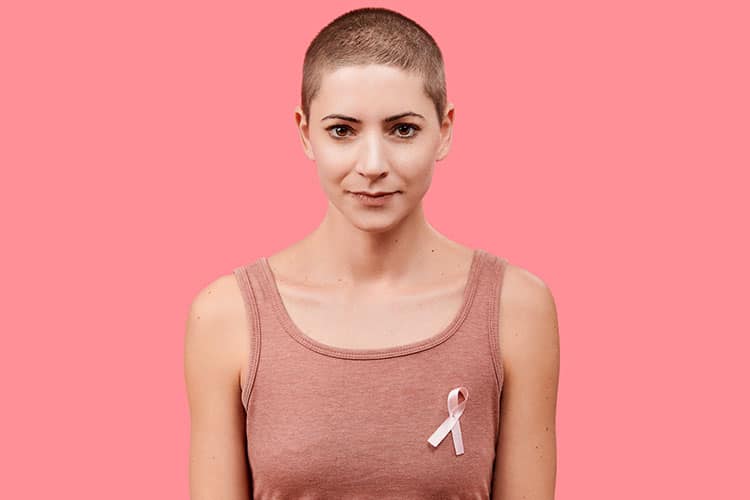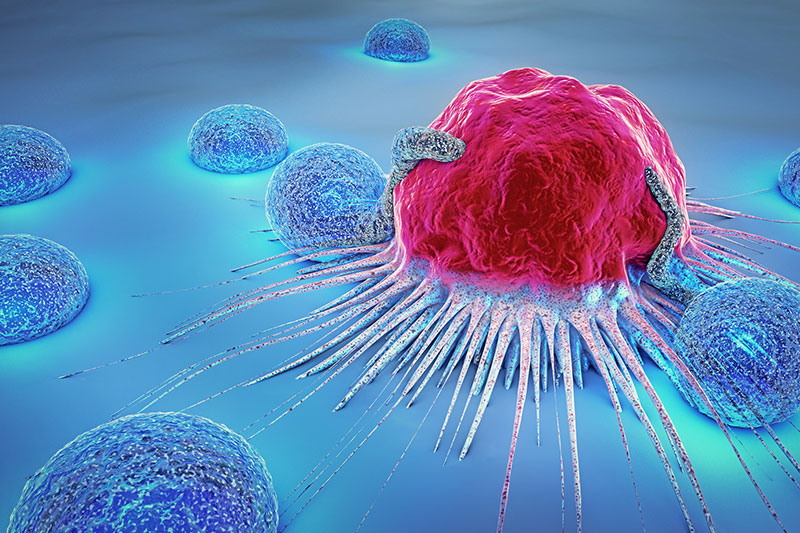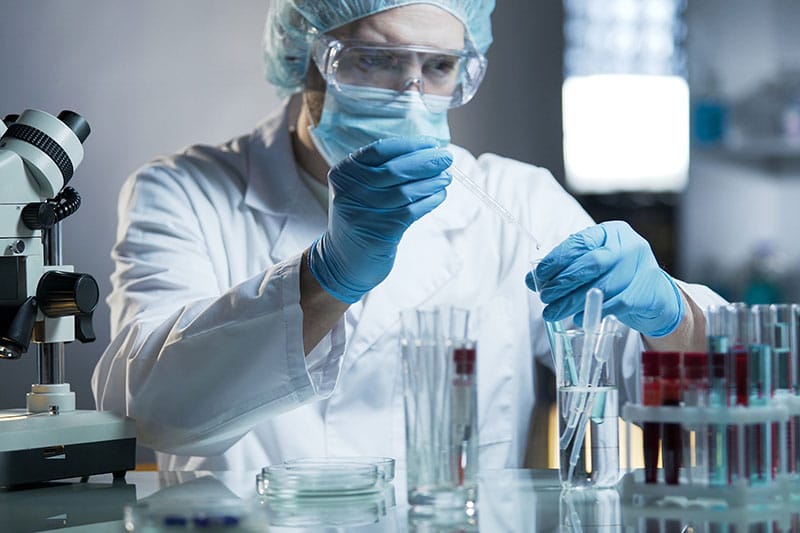Since the recent legalization of cannabis in the US, researchers have looked at the therapeutic potential of the plant. This increased attention has led to many manufacturers making unproven claims about the ability of CBD to treat everything from depression to cancer to Alzheimer’s disease.
See all CBD oil benefits here.
So how accurate are these claims? It’s important to know what CBD is and what it does before you understand how CBD oil can affect cancer cells. We’ll also look at recent peer-reviewed studies to find out if CBD oil works as a viable treatment for cancer.
What is CBD Oil
CBD oil is an extract derived from hemp plants. A close relative to cannabis, hemp contains minimal THC, which is the compound responsible for the ‘high’ typically associated with marijuana use.
Extracts from hemp plants contain large amounts of CBD with only trace amounts of THC, making hemp the ideal choice for people who want the therapeutic benefits of cannabis without the drowsiness or mental confusion.
What Does CBD Oil Do?
Cannabis plants contain compounds known as cannabinoids that interact with the human endocannabinoid system. The endocannabinoid system contains receptors located in various cells, like nerve cells and brain tissue.
You can also find endocannabinoid receptors in the immune system and non-neurological cells. Different cannabinoids will bind to different receptors, creating various reactions within these cells.
CBD is one of the best-known endocannabinoids, along with THC. Unlike THC, CBD doesn’t have hallucinogenic properties, as it binds to different endocannabinoid receptors. THC binds strongly to CB1 receptors, which you mainly find in the brain and central nervous system.
This combination creates the neurological effects of marijuana use. CBD, on the other hand, binds primarily to CB2 receptors in neural tissue, though you’ll also find them in the immune system.
This ability to bind to CB2 receptors has made CBD an appealing target for therapeutic research, including therapies for fibromyalgia,migraines, anxiety, epilepsy, and chemotherapy-induced nausea.
What is Cancer?
Cancer isn’t a single disease. Instead, it’s a name for a range of common and related diseases that stem from uncontrolled cell division and lack of cell death.
When cells function normally, they undergo a process of division and controlled cell death called apoptosis when they get old or damaged. Many mechanisms within the cell ensure that it only divides when necessary and undergoes apoptosis when it gets old.
Cancer can appear in any part of the body and have different characteristics depending on where it starts. You may even see different types of cancers arising from the same tissue, which can make identifying and treating these cancers difficult. Each type of cancer requires a different therapeutic approach and will have different outcomes based on the individual case.
What Causes Cancer?
Cancer cells start as normal, healthy cells. All cells have specific proteins that regulate their functions, and the requisite DNA to manufacture those proteins. If a particular gene gets damaged, it can affect the function of the protein, which in turn, affects the way the cell acts.
Most cellular processes have several checkpoints, which allows for some leeway in the functioning of a protein. These checkpoints ensure that even if one protein malfunctions that the rest of the process can continue.
As with industrial processes, many steps must go wrong for a disaster to happen. Many people walk around with mutations to significant genes without any adverse effects. It’s only when several genes fail at once that cancer cells can start to form.
That’s why many experts consider cancer a genetic disease. People may inherit damaged DNA from their parents, which predisposes them to certain types of cancer.
Environmental factors also play a significant role in the development of certain cancers, such as UV light for skin cancer and tobacco smoke in lung cancers. These factors also contribute to why cancer tends to affect older people more often than younger people.
How Do Cancer Cells Differ from Normal Cells
Unlike healthy cells, cancer cells don’t have a specific function. The body categorizes most cells into groups like muscle cells, nerve cells, and many others, which allows them to fulfill a specific role.
Some cells, once differentiated this way, will never divide again. Cancer cells remain uncategorized, which allows them to continue dividing and multiplying without stopping.
Once cancer cells reach a certain mass, they can enlist other cells to help the tumor grow. They then create blood vessels that feed the tumor, and they can even hijack the immune system to prevent it from controlling or killing the cancer.
How Do We Treat Cancer?
Apart from surgery, the two most common cancer treatments are chemotherapy and radiotherapy. Chemotherapy uses drugs that target and kill the fastest-growing cells in your body. Radiotherapy uses radiation in the form of X-rays to damage the DNA of cancer cells, killing them off.
Unfortunately, both of these therapies don’t specifically target cancer cells. Instead, they work on rapidly dividing cells, regardless of whether they’re cancerous or not. That’s why one of the most common side effects of chemotherapy is hair loss, as the drugs targeting rapidly dividing hair follicles.
New research into certain cancers has led to more targeted treatment. Immunotherapy can help your body recognize cancer cells as invaders, while targeted drug therapies home in on specific markers unique to cancer cells.
Current Research
To approve a compound as a viable therapeutic agent, it must go through three main stages in drug development. First, a drug must prove viable in a mammalian cell culture setting.
Then, researchers move into a live animal model, usually using mice in cancer research. The final step involves a clinical trial that not only evaluates whether a drug works but provides valuable information on safety, dosage, treatment course, and so on.
Cell Line Studies
At the moment, no clinical trials exist for CBD oil in cancer treatment. However, several pre-clinical trials show that CBD oil may show promise in treating certain types of cancer.
The issue of CBD efficacy gets more complicated because many studies will use both THC and CBD together. Some scientists speculate that THC and CBD have a synergistic therapeutic effect, meaning that treatment with both works better than treatment with either compound by itself.
Initial studies show that cannabinoids can improve anti-metastatic and anti-invasive properties of lung cancer cells in two lung cancer cell lines. This effect prevents tumors from spreading and invading surrounding tissue.
Another study found that CBD, in particular, helped induce apoptosis in breast cancer cells. Many of the most promising studies regarding CBD in cancer have focused on breast cancer, showing that it can affect several different pathways at once
Studies have shown that CBD has anti-tumorigenic properties against triple-negative breast cancer, one of the most deadly and aggressive forms of the disease. Mouse model studies where CBD inhibits breast cancer growth and metastasis have confirmed these findings
Mouse Model Studies
Most of the studies done on mice regarding the effects of cannabinoids on tumor growth and metastatic behavior rely on xenograft models. These models begin with injecting tumor cells into otherwise healthy mice. Scientists often use this model when cancer doesn’t have a distinct genetic hereditary component, and they need to produce tumors on demand.
Unfortunately, xenograft studies don’t reflect the exact situation when it comes to tumor development. Mice used in xenograft studies often have underdeveloped or non-existent immune systems to prevent them from reacting negatively to the tumors, which may impact the efficacy of certain drugs or compounds.
Another form of mouse study that has proven much more effective uses mice with cancer-specific mutations. These mice are more likely to develop cancers spontaneously, have typical immune systems, and provide a more realistic model of disease progression than xenograft studies.
Several studies on cancer-specific mice show some promise. These include a study on glioblastoma, or brain cancer, where treatment with THC and CBD increased survival rates in rats. Another study in mice with breast cancer showed reduced tumor growth, reduced blood vessel formation, and reduced metastasis to the lungs.
Using known carcinogens can also induce cancer in mice. One such study showed that CBD treatment reduced the incidence of polyps, aberrant crypt foci, and tumors in the colons of mice treated with a cancer-inducing compound. Higher doses of CBD failed to reduce the occurrence of tumors but did reduce the number of polyps and aberrant crypt foci.
CBD and Cancer in Humans
To date, there have been no formal studies on the efficacy of CBD treatment in human cancers. However, a large body of research suggests a mechanism by which CBD interacts with cancer.
Several studies have shown that tumors have significantly higher levels of CB1 and CB2 receptors than non-cancerous tissue. High levels of CB receptor expression correlate with poor prognosis for several types of cancer, including pancreatic, prostate, and squamous cell carcinoma. In these cases, cannabinoid receptor expression most likely triggers survival pathways in the cells, which results in better outcomes for the tumors and a worse outcome for the patient.
However, because endocannabinoid receptors share a link with tumor development, this connection opens up exciting opportunities to use CBD or similar compounds to treat these deadly diseases.
Palliative Care
While minimal evidence supports the claim that CBD can cure cancer, a growing body of evidence exists for the use of cannabinoids in palliative care. Cancer treatment often results in significant side effects, including nausea, vomiting, and anorexia.
Studies involving CBD have shown that it can reduce nausea associated with chemotherapy. One synthetic cannabinoid, dronabinol, is routinely used in the treatment of chemotherapy-induced nausea.
Potential Drawbacks of Using CBD Oil for Cancer
Since the FDA has not approved CBD oil for any form of medicinal use, its production and sale remain mostly unregulated. You have virtually no guarantees that you will get the product you paid for, especially when it comes to getting reliable CBD and THC concentrations.
The enzymes responsible for drug metabolism, which may affect the efficacy of medications other than CBD itself.
If you take any medication, consult with your doctor before starting CBD oil use to prevent any negative consequences or drug interactions.
Conclusion
Cannabinoids have recently received widespread attention as therapeutic agents, and with good reason. The human endocannabinoid system touches almost every facet of the body, from brain function to immune signaling. This system’s connection with all areas of the body makes cannabinoids attractive to study for a variety of disorders and diseases.
So far, CBD has proven effective in treating epilepsy, and there’s compelling evidence for its use as a viable non-opioid pain killer. These small successes have led some people to suggest that CBD is a wonder compound capable of curing almost any disease.
So can CBD oil cure cancer? According to the current evidence, no. While several promising studies show the impact of CBD and other cannabinoids on various cancer pathways, these studies haven’t progressed to creating available, FDA-approved drugs.
Until more studies produce better quality evidence, it’s wiser to stick to approved treatments that have established dosages, safety precautions, and treatment protocols. At the moment, the best use for CBD oil for cancer is in palliative care, helping to control the unpleasant side effects of chemotherapy.
If you’re considering using CBD oil for cancer, speak with your physician first. CBD can impact drug metabolism, which can be dangerous if you’re on any other medications. Your physician can also advise you on recommended CBD doses for your particular ailment
FAQs About CBD Oil For Cancer
Question: What is CBD oil?
Answer: CBD oil is an extract derived from hemp plants. A close relative to cannabis, hemp contains minimal THC, which is the compound responsible for the ‘high’ typically associated with marijuana use.
Question: What Does CBD Oil Do?
Answer: This ability to bind to CB2 receptors has made CBD an appealing target for therapeutic research, including therapies for fibromyalgia, migraines, anxiety, epilepsy, and chemotherapy-induced nausea.
Question: What Causes Cancer?
Answer: Cancer cells start as normal, healthy cells. All cells have specific proteins that regulate their functions, and the requisite DNA to manufacture those proteins. If a particular gene gets damaged, it can affect the function of the protein, which in turn, affects the way the cell acts. It’s only when several genes fail at once that cancer cells can start to form.
Question: Are there proven pieces of evidence that CBD can help to cure cancer?
Answer: At the moment, no clinical trials exist for CBD oil in cancer treatment. However, several pre-clinical trials show that CBD oil may show promise in treating certain types of cancer.
Question: How can CBD help in curing cancer?
Answer: Studies involving CBD have shown that it can reduce nausea associated with chemotherapy. One synthetic cannabinoid, dronabinol, is routinely used in the treatment of chemotherapy-induced nausea.
Question: What are the potential drawbacks of using CBD oil for cancer?
Answer: While many CBD oil manufacturers market their products as ‘safe,’ CBD oil can produce some side effects that may adversely affect your health. The main concern is that CBD interferes with enzymes responsible for drug metabolism, which may affect the efficacy of medications other than CBD itself.









